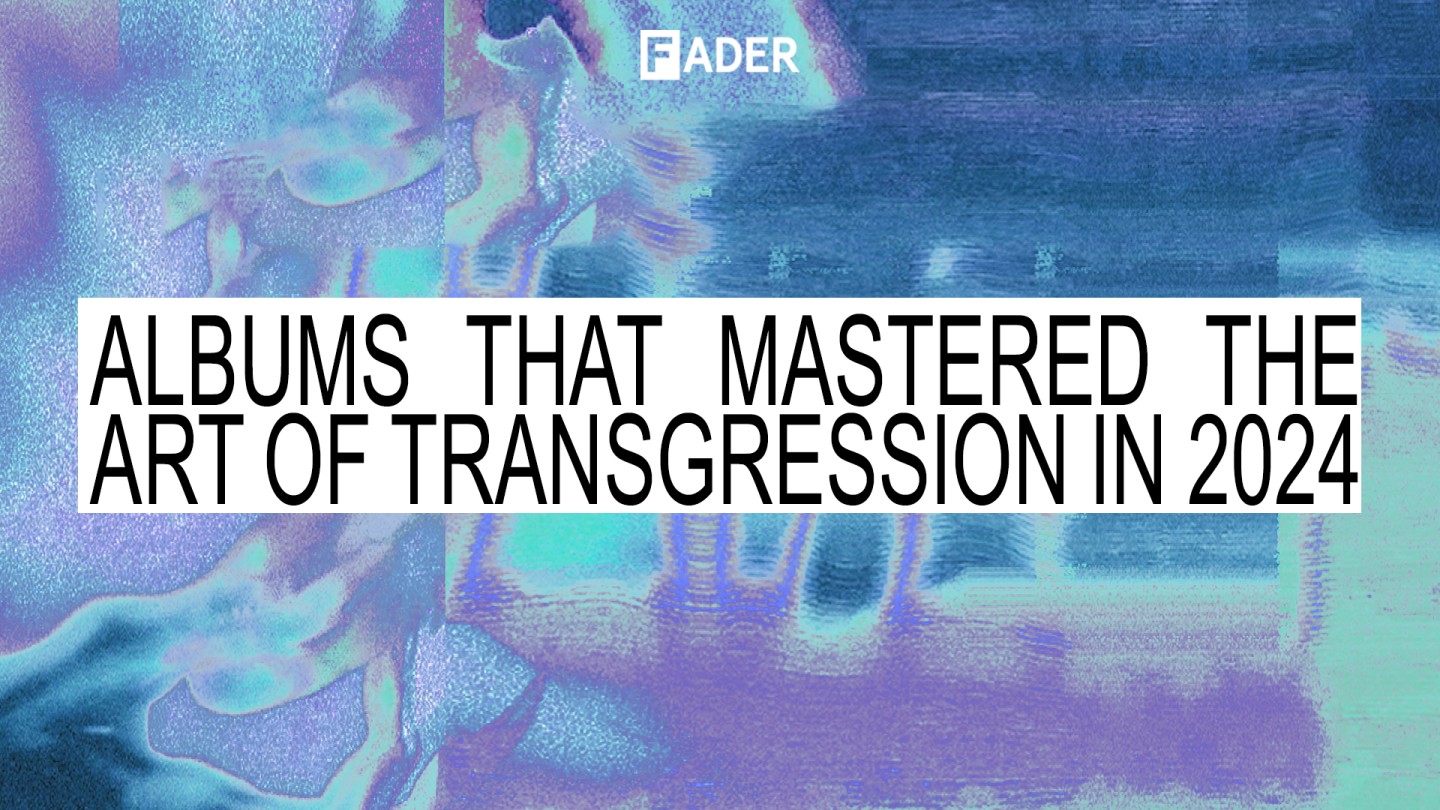Design by Cady Siregar.
Every project on our 50 Best Albums of 2024 list strained against one social more or another, from Charli XCX’s unapologetically hyper-charged late-millennial pop, with its themes of partying into your 30s while considering parenthood and the complexities of fem friendship, to Bladee’s depressed bangers, transcending their core audience of disaffected young men to reach an audience that included those who occasionally touch grass; from Kim Gordon’s nihilist boomer rage rap to the unbridled youthful energy of POLO PERKS 3 3 3, FearDorian, and AyooLii; and from Mount Eerie’s “pop-punk” essays on impermanence to d0llywood1’s diaristic digicore.
There are three albums, though, that stand out for me as the ones in our top 50 that most ingeniously sinned against the conventions of contemporary music and the industry around it: a jarring and genre-bucking rap project that’s found crossover success due to the sheer undeniability of its sneaky pop anthems, a time-hopping saga released as independently as a record can be in 2024, and a baile funk LP that drops the style’s unmistakable percussive floor from under the listener, revealing something darkly irresistible in the negative space below.
skaiwater’s #gigi, a stubbornly original surprise success
“Remember when ‘SAD!’ by XXXTentacion was the #1 song in the country and it was, like, on regular top 40 radio??” our hip-hop correspondent Vivian Medithi once texted me, describing the rarified air skaiwater breathes on, #gigi, The FADER’s favorite album of 2024. There’s something apparently impenetrable about the speaker-destroying 808s and stylistic glitches that recur at countless, irregular intervals across the record’s 13 tracks — like the hard shell of a Warhead when it first slides between the teeth and rests on the tongue. Despite the sour solidity of these songs, they’re still candy-coated, and their inherent sweetness has helped them earn the approval of a broader cross-section of listeners. As with XXX’s blown-out proto-rage, skaiwater’s fried fragments will hit immediately for some, less so for others unaccustomed to the omnivorous, shapeshifting ethos of our current Soundcloud micro-epoch.
Luckily, skaiwater’s aura is much less noxious than X’s, as well as those of more clearly aligned contemporaries such as Playboi Carti and Lil Uzi Vert, the latter of whom joined her on a remix of her 2022 megahit “#miles.” She’s also more versatile: Borrowing beat skeletons from baile funk (“richest girl alive”), Jersey club (“choke”), ultra-saturated mid-’10s trap (“heavy metal”), New Orleans bounce (“play”), and, in a surprising number of cases, throwback R&B, skaiwater demonstrates an eclecticism that could only be fostered in an age of infinite accessibility. Counting Paramore, beabadoobie, Clairo, and Alex G among her influences (alongside more obvious ones like X, Carti, and Uzi), she’s a world-class genre clasher, performing delightfully destructive crash tests on each new style she integrates. On #gigi, skaiwater has her cake and eats it too, finding mass appeal in her emphatically original songs.
Cindy Lee’s Diamond Jubilee, a press-resistant critical darling
Diamond Jubilee made its first transgression against the DSPs’ algorithmic monopoly before its first lucky listener pressed play on the two-hour, two-minute, 22-second magnum opus from the mind of ex-Women bandleader Patrick Flegel. Unlike the two wide-released previous projects from their drag alter ego Cindy Lee, this year’s record appeared unceremoniously on a clunky Geocities website — wherein the only option for purchasing it digitally was to personally PayPal Pat — and on YouTube as a single, ultra-long track. It’s now been made available as a 3XLP and as a 32-track Bandcamp stream, but for seven months, it accumulated accolade after accolade in a purely organic fashion, via gushing reviews unfacilitated by publicists or label reps. Diamond Jubilee was, in fact, so successful that Flegel canceled their tour behind the album halfway through because the hype had become too extreme for them to handle.
Of course, the purity of Diamond Jubilee’s release cycle is far from its only transgression. Gender and genre are immediately exposed before Flegel as petty constraints to be cast aside, resulting in an album that outplays every archetype it tries on at its own game, like a Greek god bestowing true love on a non-deity but ultimately moving on. Lee’s not-entirely-corporeal status, embodied but in many ways unreal, contributes to an album that is often heartwrenchingly wistful. Like a phantasm trapped in radio waves, she slides from station to station, often submerging herself in the static between them. There, she sings to past friends and lovers with a longing that burns intensely but somehow still feels as ephemeral as the breeze. In the end, whether ghost, god, or girl, Flegel’s feminine side weaves music that sounds like nothing else released this year, and likely for years to come.
DJ Anderson do Paraíso’s Queridão, a drumless dance-floor demolisher
Queridão by DJ Anderson do Paraíso
As the explosive sounds of Brazilian baile funk reach more and more ears in the northern hemisphere, the genre has quickly become a favorite of club DJs. Though easily identifiable, as many dance musics are, by a signature repetitive rhythm, funk is an inherently transgressive genre, with every new Rio de Janeiro and São Paulo DJ seemingly hell-bent on making crazier sounds than the last. But in Belo Horizonte, roughly 400 kilometers north and 500 miles west of the coast, a new strain called funk mineiro is inverting this trend, producing some of the hardest-hitting tracks in the world through the power of suggestion.
At the forefront of this scene is DJ Anderson do Paraíso, who dropped not one but two of the best baile funk records of 2024. The first of these was Queridão, a Nyege Nyege Tapes release that compiled new tracks and greatest hits for a massive introduction to one of the most exciting artists on Earth. Here, we enter a dark realm where drums are almost entirely absent, replaced by detuned bass blasts that resound like stones hitting whatever lies beneath a bottomless pit. Anderson’s transgression is not one of excess but one of withholding, proving that funk’s essential ferocity is magnified, not weakened, when de-fleshed.




